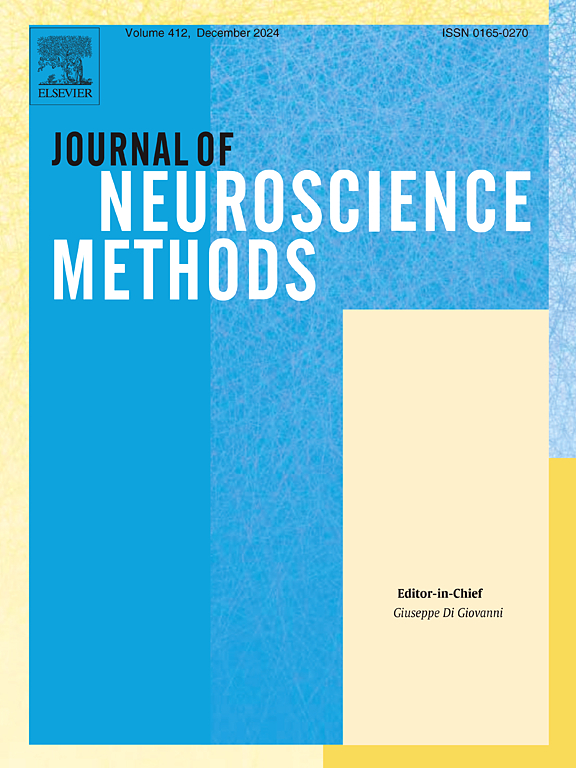EC-FST: A novel pipeline for automatically analyzing mouse forced swim test
IF 2.3
4区 医学
Q2 BIOCHEMICAL RESEARCH METHODS
引用次数: 0
Abstract
Background
The mouse forced swim test (FST) is widely used to evaluate the efficacy of potential anti-depressant drugs. Traditional methods for analyzing forced swim test results rely on manually setting the threshold for immobility, which is time-consuming and barely reproducible.
New method
In the present study, we introduced a novel pipeline (EC-FST) by extracting the feature of mouse status instead of calculating immobility time. First, we utilized event camera, a powerful AI tool for dynamic object-tracking framework, to capture the mobile events from mouse forced swim test. By quantifying event numbers and their temporal distribution, we were able to determine mouse’s mobile state across time-line.
Results
The EC-FST results showed perfect correlation with manual scoring, suggesting that the proposed method is reliable for analyzing forced swim test. We further tested the power of the EC-FST for detecting depressive-like behavior in mouse depression models,including lipopolysaccharide (LPS) injection and chronic restraint stress (CRS). Depressive-model mice exhibited significantly fewer motion events and lower event frequency than controls, aligning with manual scoring.
Comparison with existing methods
Unlike traditional threshold-based approaches, EC-FST provides an automated, unbiased, and reproducible analysis of FST behavior, eliminating the subjectivity of manual scoring.
Conclusion
Leveraging AI-driven event cameras, we established a robust pipeline for analyzing mouse behavior in the FST, offering greater efficiency and reproducibility for depression research.
EC-FST:一种新的自动分析小鼠强迫游泳试验的流水线。
背景:小鼠强迫游泳试验(FST)被广泛用于评估潜在抗抑郁药物的疗效。分析强迫游泳测试结果的传统方法依赖于手动设置不动阈值,这既耗时又难以重现。新方法:在本研究中,我们引入了一种新的管道(EC-FST),通过提取小鼠状态特征而不是计算静止时间。首先,我们利用事件相机这一强大的人工智能动态对象跟踪框架工具,捕捉鼠标强迫游泳测试中的移动事件。通过量化事件数及其时间分布,我们能够确定鼠标在时间线上的移动状态。结果:EC-FST结果与人工评分完全相关,提示本文方法对强迫游泳试验的分析是可靠的。我们进一步测试了EC-FST在小鼠抑郁模型(包括脂多糖(LPS)注射和慢性抑制应激(CRS))中检测抑郁样行为的能力。抑郁模型小鼠表现出的运动事件和事件频率明显低于对照组,与手动评分一致。与现有方法的比较:与传统的基于阈值的方法不同,EC-FST提供了对FST行为的自动化、无偏和可重复的分析,消除了人工评分的主观性。结论:利用人工智能驱动的事件相机,我们建立了一个强大的管道来分析小鼠在FST中的行为,为抑郁症研究提供了更高的效率和可重复性。
本文章由计算机程序翻译,如有差异,请以英文原文为准。
求助全文
约1分钟内获得全文
求助全文
来源期刊

Journal of Neuroscience Methods
医学-神经科学
CiteScore
7.10
自引率
3.30%
发文量
226
审稿时长
52 days
期刊介绍:
The Journal of Neuroscience Methods publishes papers that describe new methods that are specifically for neuroscience research conducted in invertebrates, vertebrates or in man. Major methodological improvements or important refinements of established neuroscience methods are also considered for publication. The Journal''s Scope includes all aspects of contemporary neuroscience research, including anatomical, behavioural, biochemical, cellular, computational, molecular, invasive and non-invasive imaging, optogenetic, and physiological research investigations.
 求助内容:
求助内容: 应助结果提醒方式:
应助结果提醒方式:


